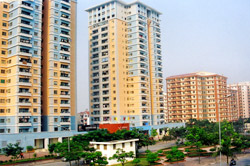Property firms still face difficulties
The State Bank of Vietnam (SBV) has slashed the ceiling lending interest rate for short-term dong loans to 13 per cent per year.
The decision to loosen credit for the property market and remove it from a portfolio for which lending was restricted was extraordinary, said Nguyen Thi Hong, from the SBV Monetary Policy Department.
Under a resolution issued last month, the government implemented a variety of measures, including a land rent and tax reduction, tax payment extension and price control, to help companies deal with difficulties.
Many commercial banks have launched preferential lending packages for property areas, including house construction, investment and trading.
CMC Tile JSC general director Nguyen Quang Huy and Tu Lien Co director Le Van Tu said it was not easy for enterprises and individuals to access these packages, however.
Individuals who wanted to buy a house ought to select projects financed by banks, besides having to negotiate with them about mortgage assets and borrowing terms with complicated procedures.
For construction firms or property dealers, showing practical business plans with good development prospects to qualify for loans was very hard at present in the face of a frozen property market.
According to a recent Vietnam Chamber of Commerce and Industry (VCCI) survey, only about 60 per cent of local firms could currently bear interest rates of between 12 and 13 per cent, popular "preferential" levels now offered by banks.
This showed that current interest rates, though slashed, were still high compared to the practical abilities of many enterprises, Hanoi Land Co director Nguyen Dinh Tung said, noting that this was a great barrier for construction firms.
He added that preferential packages drew little interest from businesses in the current stagnant property market, which had seen almost no measures to stimulate demand.
Tien Thanh General Trading Co director Bui Duc Toan agreed that it was necessary to encourage demand, noting: "If purchasing power wasn't improved...firms wouldn't be able to continue production and investment activities and would have no profits for paying taxes."
Dinh Ngoc Son, director of Vietcombank's Lao Cai branch, said enterprises needed to use loans efficiently and assure their ability to repay debts.
"This must be closely considered and controlled," he stressed.
Hong said banks seeking to improve credit growth would not loosen standards of lending and would have to assure an outstanding loan ratio of no more than 16 per cent for this year.
She said it would take a certain period for the government interest cut and tax reduction policies as well as commercial preferential packages to take positive effect among enterprises.
"Expected results may come in at least three months," said economist Le Dang Doanh.
What the stars mean:
★ Poor ★ ★ Promising ★★★ Good ★★★★ Very good ★★★★★ Exceptional
Latest News
More News
- An Phat 5 Industrial Park targets ESG-driven investors in Hai Phong (January 26, 2026 | 08:30)
- Decree opens incentives for green urban development (January 24, 2026 | 11:18)
- Public investment is reshaping real estate’s role in Vietnam (January 21, 2026 | 10:04)
- Ho Chi Minh City seeks investor to revive Binh Quoi–Thanh Da project (January 19, 2026 | 11:58)
- Sun Group launches construction of Rach Chiec sports complex (January 16, 2026 | 16:17)
- CEO Group breaks ground on first industrial park in Haiphong Free Trade Zone (January 15, 2026 | 15:47)
- BRIGHTPARK Entertainment Complex opens in Ninh Binh (January 12, 2026 | 14:27)
- Ho Chi Minh City's industrial parks top $5.3 billion investment in 2025 (January 06, 2026 | 08:38)
- Why Vietnam must build a global strategy for its construction industry (December 31, 2025 | 18:57)
- Housing operations must be effective (December 29, 2025 | 10:00)

















 Mobile Version
Mobile Version